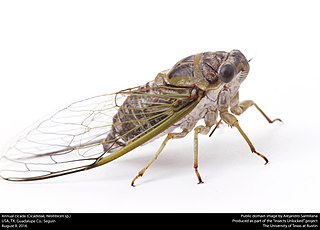
Cicadidae, the true cicadas, is one of two families of cicadas, containing almost all living cicada species with more than 3,200 species worldwide.

Pomponia is a genus of cicadas from Asia. A group of species previously placed in Pomponia, containing the largest cicada species found on earth, have recently been moved to Megapomponia. However, the remaining species still form a very heterogeneous group and Duffels and Hayashi (2006) mentioned that several species should probably be transferred to genera like Terpnosia and Leptosemia.

The Cicadinae are a subfamily of cicadas, containing the translucent cicadas. They are robust cicadas and many have gaudy colors, but they generally lack the butterfly-like opaque wing markings found in many species of the related Tibiceninae.

Platypleura is a genus of cicadas that occurs widely across Africa and southern Asia. Some of the South African species are remarkable for their endothermic thermoregulation that enables crepuscular signalling, an adaptation that reduces risk of predation and enables a greater range for their calls. In field experiments their maximum body temperature while calling at dusk, was measured at 22 °C above ambient temperature.

Cicadetta is a genus of generally small-bodied annual cicadas widespread across portions of the Palearctic, Indomalayan, and Afrotropical realms. In older scientific and taxonomic literature, this genus was popularly referred to as Melampsalta. These cicadas occur in a diverse spectrum of habitats, although most taxa are typically associated with weedy meadows and tallgrass prairie ecosystems. Several related species from North America were recently transferred to the genus Cicadettana.

Quesada is a genus of Cicadas in the family Cicadidae. There are at least two described species in Quesada.
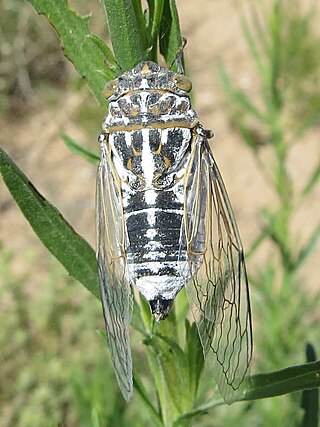
The genus Hadoa comprises large-bodied Cicadidae occurring in Western North America. Until recently, these species were in the genus Tibicen, which has now been redefined so as to include only a few European species, while most species from the Eastern and Central US are now placed in Neotibicen and Megatibicen.
Pacarina is a genus of cicadas in the family Cicadidae. There are at least four described species in Pacarina.

Okanagana is a genus of cicadas in the family Cicadidae. There are at 58 described species in Okanagana.

Cacama is a genus of cicadas in the family Cicadidae commonly known as cactus dodgers. There are about 12 described species in Cacama.

Megatibicen is a genus of cicadas in the family Cicadidae, with about 10 described species. Until 2016, these species were included in the genus Tibicen and then briefly in Neotibicen. The species formerly of genera Ameritibicen Lee, 2016 and Gigatibicen Lee, 2016 are now considered species of Megatibicen Sanborn & Heath, 2016.
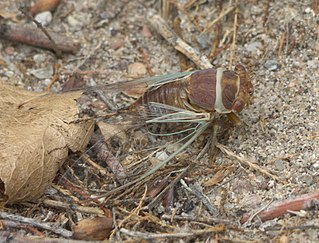
Diceroprocta is a genus of scrub cicadas in the family Cicadidae. There are at least 60 described species in Diceroprocta.
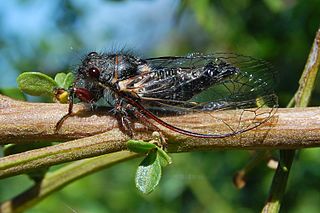
Platypedia is a genus of cicadas in the family Cicadidae. There are more than 20 described species in Platypedia.
Abroma is a genus of cicadas in the family Cicadidae. There are at least 20 described species in Abroma.

Tibicininae is a subfamily of cicadas in the family Cicadidae. There are 5 tribes and at least 140 described species in Tibicininae. They are found in the Neotropics, the Nearctic, and the Palearctic.
Taphurini is a tribe of cicadas in the family Cicadidae, found in the neotropics.
Burbunga is a genus of cicadas in the family Cicadidae, found in Australia. There are about 11 described species in Burbunga.
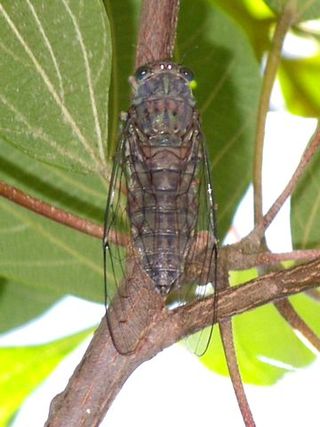
Leptopsaltriini is a tribe of cicadas in the family Cicadidae. There are at least 200 described species in Leptopsaltriini, found in the Palearctic, Nearctic, and Indomalaya.

Dundubia is a genus of cicadas in the subfamily Cicadinae and the type genus of the tribe Dundubiini.
Guyalna is a genus of cicadas in the family Cicadidae. It was first described by Boulard and Martinelli in 1996. Members of this genus are characterized by three-segmented tarsi, a rounded timbal cover apex, a pronotum shorter than the mesonotum, the head as wide or slightly wider than the mesonotum, and slightly protruding eyes, according to the authors who first described it.













